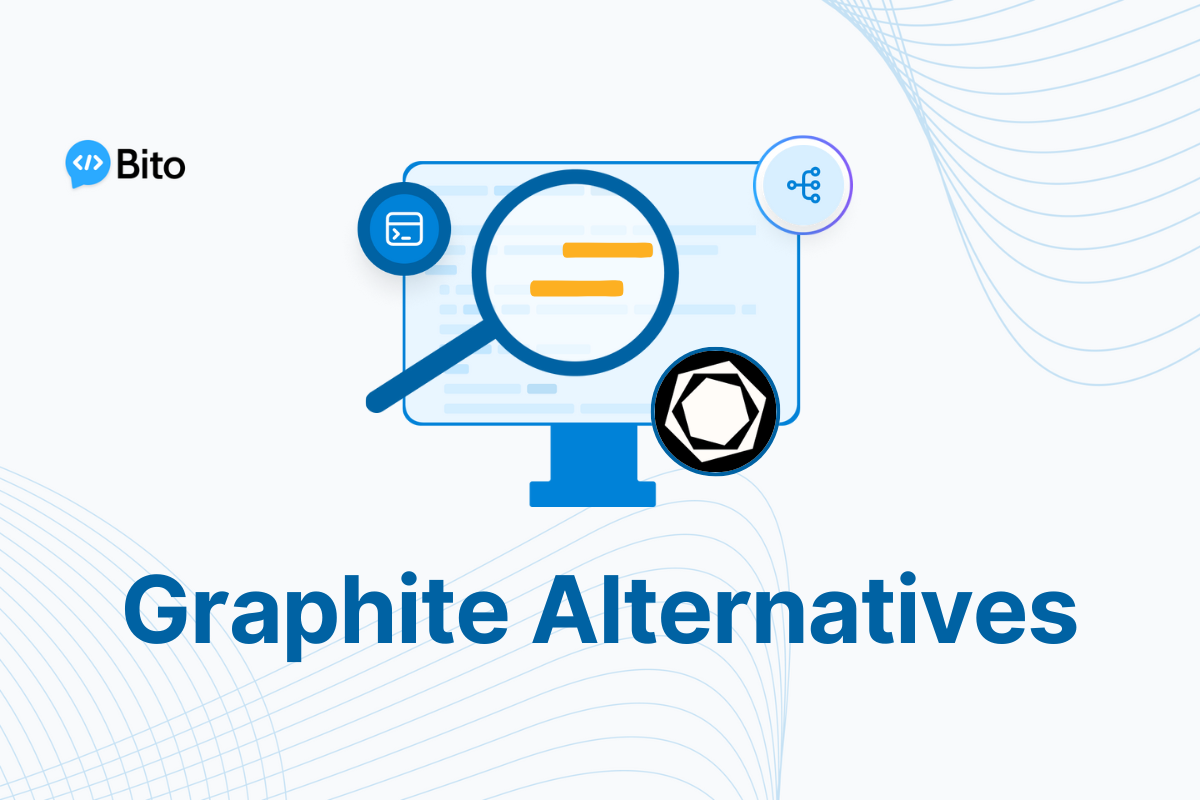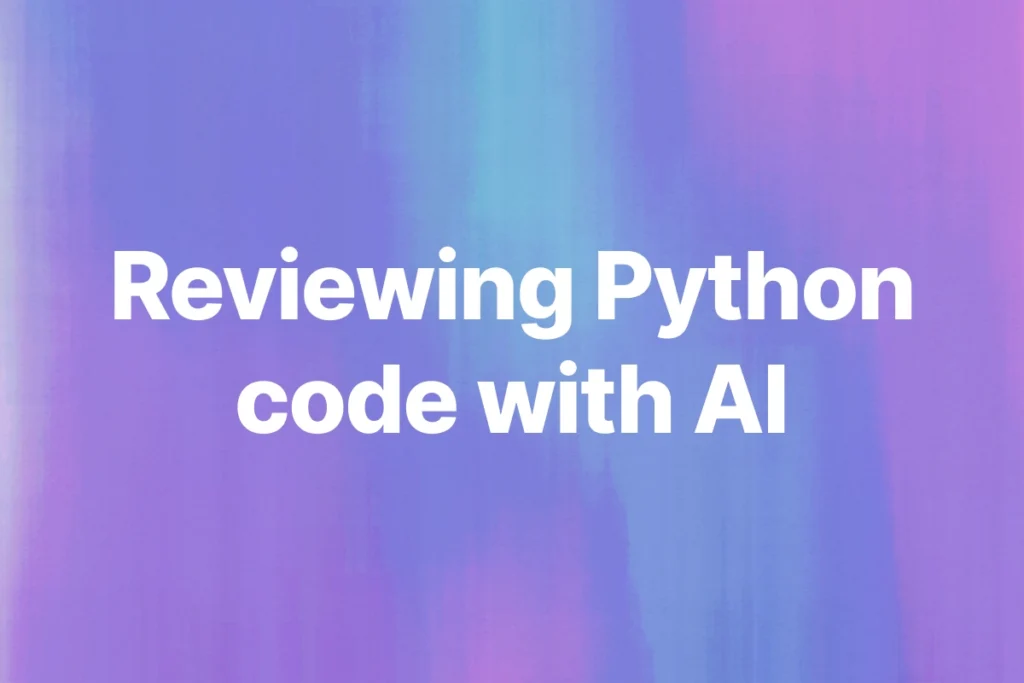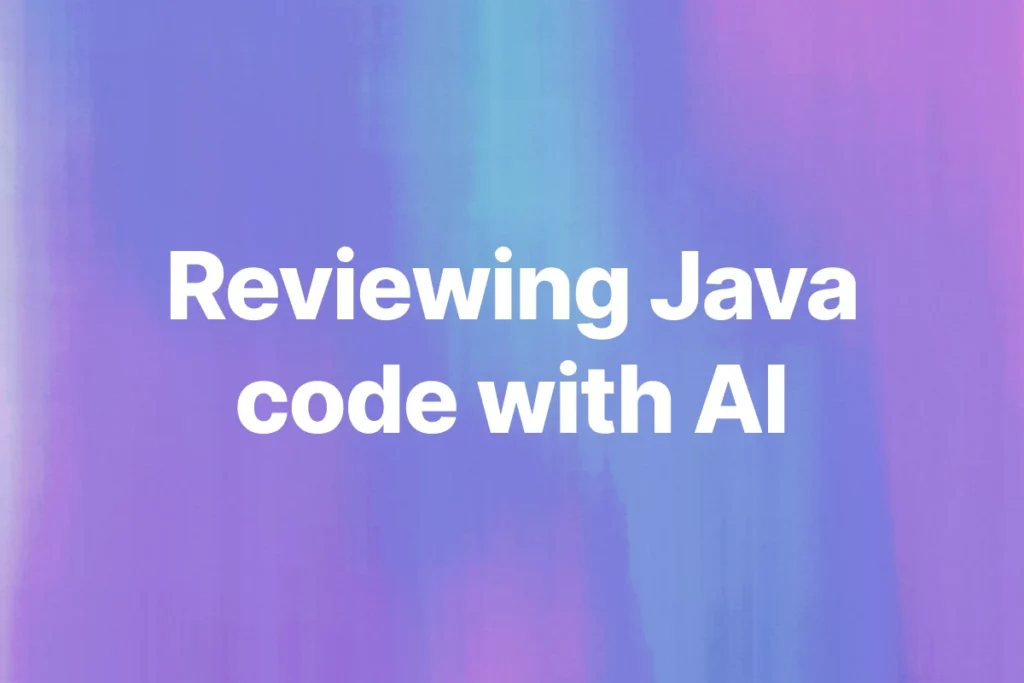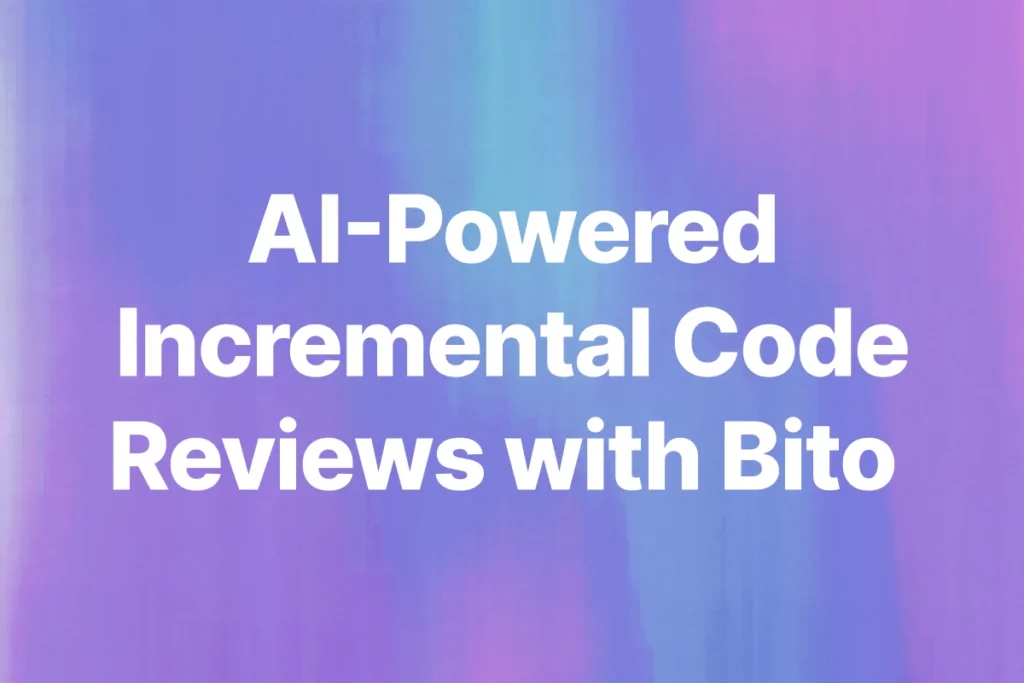Graphite’s Diamond code reviewer delivers fast, context-aware feedback with generous limits for solo developers. However, its GitHub-only focus and lack of conversational AI often send teams looking elsewhere. If you need multi-host coverage, the ability to query the reviewer directly, and overall more features at lower pricing, Bito’s AI Code Review Agent is a strong alternative.
There are plenty of other rivals as well. So, in this guide I will help you explore the top AI code-review tools so you can choose the best fit for your team.
Choosing the right AI code-review tool
When I evaluate an AI reviewer, I run through five questions:
- Does it add signal or noise? High-quality comments, minimal hallucinations.
- How deep is its context? Full-repo indexing beats diff-only scanning.
- Can I bend the rules? Plain-English guardrails are worth gold.
- Is my code safe? SOC 2, on-prem options, zero retention policies.
- How will finance feel? Per seat, per file, or per lines of code—pick what fits your workflow.
Trial any contender on a real pull request and let the feedback speak for itself.
1- Bito’s AI Code Review Agent
Bito installs with a single click on GitHub, GitLab, or Bitbucket and immediately indexes your entire repository. That global context lets its comments reference related files, catch hidden side effects, and suggest secure patterns. Developers can chat with the agent for clarifications, accept one-click fixes, or tweak behavior through plain-text rules. Privacy is baked in—code isn’t stored or reused for model training.
Bito’s review output feels like a panel of specialists: one focuses on security, another on performance, a third on style. Each leaves concise notes, so humans spend less time policing and more time designing. Analytics tie it all together, showing which files trigger the most warnings and whether quality trends up or down.
Teams I’ve worked with see pull-request cycle times drop because reviewers no longer wade through low-value feedback; Bito already flagged the obvious stuff.
Key features
- Full-repository understanding
- AI-generated pull request summary
- Inline suggestions with auto-fix patches
- One-click setup for GitHub, GitLab, and Bitbucket
- Custom code review rules and guidelines
- High-level feedback in Changelists
- Chat with AI for follow-up questions
- Security, performance, and style checks out of the box
- Analytics dashboard
- SOC 2 Type II compliance
- Code is never stored, retained, or used for model training purposes
- And much more.
Pricing details
Free tier with PR summaries; Team plan around $15 per developer per month; Enterprise plan also available.
2- CodeRabbit
CodeRabbit builds an abstract syntax tree of your project to understand relationships across files. Each pull request gets a concise, human-readable summary, followed by inline comments that reference the wider code graph. Reviewers can “chat” with the bot, asking why a particular edge case matters or requesting additional tests.
Its one-click fix suggestions often eliminate mechanical changes—think missing null checks or obvious refactors. CodeRabbit integrates natively with GitHub and GitLab, making it easy to slot into existing workflows.
For teams drowning in large PRs, the graph context is a lifesaver; feedback stays relevant even when a change spans multiple modules.
Key features
- Code-graph context for precise comments
- Natural-language PR summaries
- Interactive chat on the pull request
- Automatic quick-fix patches
- Linter and SAST integrations in higher tier
- Supports monorepos without extra config
Pricing details
Free summaries; Lite plan roughly $15 per developer per month; Pro plan roughly $30.
3- Qodo Merge
Born as an open-source GitHub app, Qodo Merge now supports GitHub, GitLab, Bitbucket, and Azure. The agent auto-writes well-structured PR descriptions when developers forget, then performs a guided, context-aware review. Its comments adapt as the agent learns your repository’s conventions over time.
Ticket-compliance analysis ensures every pull request references the right issue, reducing “drive-by” changes. Reviewers can invoke an interactive walkthrough that highlights the rationale behind each warning.
Open-source roots make it easy to self-host or inspect code, which security-conscious orgs appreciate.
Key features
- Multi-platform Git integration
- AI-generated PR descriptions
- Guided review comments and walkthroughs
- Repository-specific learning for better precision
- Issue-link compliance checks
- Open-source core, transparent architecture
Pricing details
Free for individuals and open source; Team plan about $19 per user per month; Enterprise plan around $45 with self-host.
4- Tabnine Code Review Agent
Tabnine turns your written coding standards into more than a hundred automated rule checks. It runs both in the IDE and on pull requests, flagging deviations before code hits the main branch. Because rules are derived from your own docs—or inferred from previous reviews—the agent enforces team culture rather than generic style guides.
Early adopters love the pre-commit feedback loop: issues appear in the editor while developers type, so PRs arrive cleaner. Tabnine currently offers this agent in a private enterprise preview, focusing on larger teams with established standards.
Key features
- Converts docs into rule checks
- IDE and PR integration for early warnings
- Supports major statically typed languages
- One-click fixes for rule violations
- Runs fully inside corporate network
- Learns from historical reviews to refine checks
Pricing details
Available in enterprise preview; pricing bundled with Tabnine Enterprise.
5- Greptile
Greptile builds a language-agnostic code graph, enabling deep, cross-file analysis. When it spots a potential bug, it not only comments but proposes the exact patch—developers click once to commit the fix. A chat bot inside the PR explains reasoning or locates related code paths.
With support for thirty-plus languages, Greptile shines in polyglot microservice setups. Self-hosting is available for teams that need to keep everything behind their firewall.
Key features
- Whole-repo graph index for rich context
- Inline quick-fix patches
- PR-embedded chat assistant
- Supports more than thirty languages
- SOC 2 compliance
- On-prem deployment option
- Usage-based pricing with a monthly cap
- Free 14-day trial
Pricing details
Forty-five cents per file changed, capped at $50 per developer per month.
6- Trag
Trag brands itself an LLM super-linter. You write patterns in everyday English—“never log user passwords,” “all API calls need error handling”—and Trag enforces them on every pull request across every language. Template libraries cover common best practices if you’d rather not start from scratch.
Because patterns live outside the model, tweaking rules is as easy as editing a text file. The dashboard tracks how often each rule triggers, helping teams fine-tune their guidelines.
Key features
- Unlimited custom rules in plain English
- Template catalog for quick starts
- Instant feedback on pull requests
- Rule-usage analytics dashboard
- Works with any language
- Self-host and BYO-LLM options in Enterprise
- Free plan to test the waters
Pricing details
Free summaries; Team plan $20 per engineer per month; Enterprise plan custom.
7- CodeAnt AI
CodeAnt tackles both quality and security. It deep-scans every pull request, flags smells or vulnerabilities, and offers one-click patches. IDE plugins catch issues earlier, while CI hooks can block merges on critical findings.
Teams can define custom rules in natural language, extending checks beyond the built-ins. Continuous-audit modes scan entire repositories, surfacing legacy debt alongside new code issues.
Key features
- Unlimited AI pull-request reviews
- One-click fixes for quality and security issues
- IDE and CI/CD integrations
- Custom rule authoring in plain language
- Supports thirty-plus languages
- Continuous code-health and security audits
- 14-day free trial
Pricing details
AI Code Review: $10 per user per month; Quality or Security add-ons: $15 each.
8- Codacy
Codacy has long delivered static analysis across forty-plus languages. Every PR receives quality, security, duplication, and coverage checks. A dashboard tracks grades over time, while recent AI helpers draft fixes developers can apply instantly.
Coverage gates and fail-the-build rules push testing discipline. With a generous free tier for open-source projects, Codacy remains a favorite in the community.
Key features
- Automated quality and security scans on PRs
- Coverage-aware merge gating
- Historical trend dashboards
- IDE assistant integration
- Over forty language engines
- Free forever for public repos
- API and badge support for CI pipelines
Pricing details
Pro plan about $18 per user per month; open-source free; Enterprise custom.
9- Code Climate
Code Climate’s Quality engine measures maintainability, complexity, duplication, and test coverage. Custom quality gates block merges if metrics dip below thresholds. For managers, Velocity dashboards track engineering throughput and debt.
It supports multiple languages and lets teams fine-tune which analysis engines run, balancing depth against CI time.
Key features
- Maintainability and duplication detection
- Customizable quality and coverage gates
- Trend and debt dashboards
- Startup plan free for small teams
- Supports all major languages
- Integrates with GitHub, GitLab, Bitbucket
- CLI for local analysis
Pricing details
Open-source and small-startup tiers free; Team plan roughly $17 per user per month.
10- Amazon CodeGuru Reviewer
Part of the AWS toolbox, CodeGuru Reviewer focuses on Java, Python, and a growing list of languages. It flags performance antipatterns, AWS API misuses, and common bugs, adding links to documentation that explain the fix.
Because pricing is line-of-code based, teams with many developers but modest codebases can save versus per-seat models.
Key features
- ML-driven bug and performance detection
- Security vulnerability comments
- Deep AWS-API best-practice knowledge
- Works with major git hosts
- 90-day 100k-line free trial
- Integrates with CodeGuru Profiler for runtime insights
Pricing details
$10 for the first 100 k lines per repo each month, $30 for every additional 100 k.
11- CodeScene
CodeScene inspects git history to uncover hotspots—files that change often and have low code health. When a pull request touches a hotspot, CodeScene warns the reviewer and suggests improvements. Knowledge-map views highlight ownership gaps, signaling areas at risk if key devs leave.
Organizations use CodeScene to prioritize refactors and track technical-debt payoff over time.
Key features
- Hotspot and technical-debt detection
- Code-health scoring inside PRs
- Knowledge-map insights on team ownership
- Custom quality gates tied to debt budgets
- Cloud and on-prem deployment options
- Trend reports for leadership
Pricing details
Professional tier starts around €18 per user per month; open-source free; Enterprise around €30 with self-host.
12- Reviewable
Reviewable replaces GitHub’s review UI with a smarter, checklist-driven interface. It remembers what you’ve already reviewed after a force push, splits large PRs into manageable chunks, and tracks when every thread is resolved.
Because no AI is involved, Reviewable pairs well with any automated commenter: let the bot flag issues, then use Reviewable to shepherd human discussion.
Key features
- Persistent comments through rebases
- Thread-resolution tracking
- Multi-file, multi-line comment support
- Reviewer completion indicators
- Custom review-completion rules
- Free for personal and public repos
Pricing details
Team plan $8 per contributor per month; Business $16; open-source free.
13- Snyk Code
Snyk’s DeepCode AI scans pull-request diffs for security flaws and code-quality bugs, tracing data flow end-to-end to prove exploitability. It can even auto-open fix PRs. Combined with Snyk’s dependency, container, and IaC scanning, teams get a full security blanket in one platform.
IDE plugins surface issues as you type, reducing noisy PR feedback loops.
Key features
- AI-powered vulnerability and bug detection
- Explain-and-fix guidance with code examples
- IDE, CLI, and SCM integrations
- Unlimited tests on paid tiers
- Bundled dependency, container, and IaC scans
- Rich governance and reporting features
Pricing details
Free tier with limited tests; Team plans start near $25 per developer per month, scaling with bundles.
Conclusion
AI code reviewers are no longer fancy linters; they’re tireless teammates. Whether you need deep code-graph context, plain-English rule enforcement, or laser-focused security checks, there’s a tool tuned for your pains. Trial one or two on a busy repository, watch cycle times shrink, and leave the stylistic nitpicks to silicon while your human reviewers tackle the architecture that really matters.






